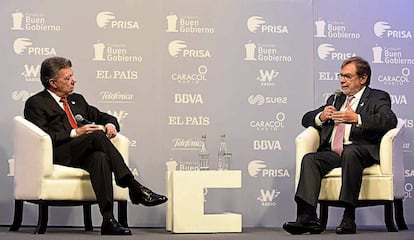“Colombians will not understand those who want to stop history”
President Juan Manuel Santos tells PRISA’s Juan Luís Cebrián peace process is irreversible


Colombia’s President Juan Manuel Santos says that the final word on the peace deal his administration has just reached with the leftist rebels of the Revolutionary Armed Forces of Colombia (FARC) lies with all Colombians, and that despite the risks, he always believed it would have to be put to a referendum.
That referendum will be held on October 2, just five weeks after the conclusion of the four-year-long peace talks in Havana that have brought an end to half-a-century of conflict in the South American country.
But as Santos pointed out in a conversation on Wednesday with Juan Luis Cebrián – chairman of the PRISA media group, which owns EL PAÍS – as part of a forum in Bogota to discuss the peace process, powerful forces in Colombia still oppose the peace deal. “But the Colombian people will not understand those who want to stop history.”
Let’s hope that those who are opposed to this process see an opportunity to build peace as a nation President Juan Manuel Santos
“I believe in the intelligence and wisdom of the Colombian people. Who wants to return to war or set back the development of rural areas? This is a great opportunity for the future, for people to regain their faith in peace. Colombia will be a country where people can live without fear,” he said at the Los beneficios de la paz (The benefits of peace) forum in the Colombian capital, organized jointly by PRISA and the Buen Gobierno Foundation, with the collaboration of EL PAÍS and radio stations La W and Caracol Radio.
The announcement of the peace accord between the government and the FARC on August 24 made headlines around the world, turning Colombia into a good news story for once, in contrast to the problems many of its neighbors face: the impeachment of Dilma Rousseff, the crisis in Mexico sparked by Donald Trump’s visit, and the mass street protests in Venezuela. But Santos said that the instability in much of Latin America will not affect Colombia’s post-conflict progress.
Santos mentioned the ongoing crisis in Venezuela, which, under the regime installed by Hugo Chávez in the late 1990s, has allied itself with the FARC. Referring to former president Álvaro Uribe’s attacks on Santos, accusing him of caving in to the FARC by allowing it to reform as a political party, and stating that the country is headed down the same road as Venezuela, Santos noted: “What aspect of the accords could make anybody think such a thing? This process will strengthen Colombia’s institutions. How is the FARC ever going to end up in power, by selling Marxist-Leninism? That’s completely a thing of the past. Or maybe the same Bolivarian revolution as Chávez’s. That’s not going to work too well…”
A referendum will be held just five weeks after the conclusion of the peace talks that have brought an end to half-a-century of conflict
During his conversation with Santos, Cebrián suggested that Santos and future presidents face a bigger challenge building peace than in reaching a peace accord. “We have negotiated the end of the conflict. Let’s hope that those who are opposed to this process see an opportunity to build peace as a nation,” said Santos.
Cebrián also asked Santos about the cost of rebuilding a post-conflict Colombia, an issue the president was reluctant to discuss in detail, pointing out only that a number of important programs were already underway, which would help buffer the cost to the economy at a time of limited growth. “But we will maintain fiscal discipline,” he insisted, aware of the need to attract foreign investment in the coming years.
The forum took place at the El Nogal club, rebuilt after the FARC place a bomb there in 2003, which killed 36 people and injured dozens more. Among the dead was the son of Martha Luz Amorocho, a member of a delegation representing victims of the conflict. She has supported the peace process, and like former president César Gaviria, is campaigning for the Yes camp in the referendum. Over the course of the negotiations, Amorocho has met with FARC members and repeatedly called for reconciliation. After meeting with President Santos on Wednesday at El Nogal, she again expressed her support for the peace process, saying: “Visitors, workers, club members, and also guerrillas died in that attack. They didn’t even attain their objective.” She also explained how she met a guerrilla and hugged him. “He was a kid about the same age as my children... We’re able to turn the page on this.”
English version by Nick Lyne.
Tu suscripción se está usando en otro dispositivo
¿Quieres añadir otro usuario a tu suscripción?
Si continúas leyendo en este dispositivo, no se podrá leer en el otro.
FlechaTu suscripción se está usando en otro dispositivo y solo puedes acceder a EL PAÍS desde un dispositivo a la vez.
Si quieres compartir tu cuenta, cambia tu suscripción a la modalidad Premium, así podrás añadir otro usuario. Cada uno accederá con su propia cuenta de email, lo que os permitirá personalizar vuestra experiencia en EL PAÍS.
¿Tienes una suscripción de empresa? Accede aquí para contratar más cuentas.
En el caso de no saber quién está usando tu cuenta, te recomendamos cambiar tu contraseña aquí.
Si decides continuar compartiendo tu cuenta, este mensaje se mostrará en tu dispositivo y en el de la otra persona que está usando tu cuenta de forma indefinida, afectando a tu experiencia de lectura. Puedes consultar aquí los términos y condiciones de la suscripción digital.








































